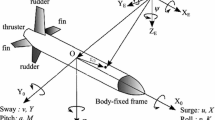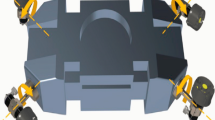Abstract
This paper is concerned with a robust adaptive fault-tolerant compensation control problem based on sliding mode technique for an unmanned marine vehicle (UMV) with thruster faults and unknown persistent ocean disturbances. A general thruster fault model including partial, total and time-varying stuck is built for the first time. Once the thrusters occur unknown and time-varying stuck faults, the mission of the UMV may be canceled. To avoid it, full-rank decomposition of the thruster configuration matrix is made, based on which a linear sliding surface is constructed and adaptive mechanism is incorporated into sliding mode reaching law. Without the prior knowledge of ocean external disturbances, sliding mode stability is analyzed and a sufficient stability condition through H∞ technique is given. Further the nonlinear unit vector gain of the adaptive sliding mode fault-tolerant compensation controller is designed to ensure the UMV system errors converge to zero independent of fault detection and diagnosis (FDD) mechanism. Finally, the comparison simulation results through a typical floating production ship are shown to testify the feasibility of the presented method.
Similar content being viewed by others

References
X. Wang, X. Zhang, and X. Yang, “Delay-dependent robust dissipative control for singular LPV systems with multiple input delays,” International Journal of Control, Automation and Systems, vol. 17, no. 2, pp. 327–335, February 2019.
Q. Y. Su, H. C. Zhu, and J. Li, “Static output feedback stabilization of a class of switched linear systems with state constraints,” International Journal of Control, Automation and Systems, vol. 16, no. 2, pp. 505–511, April 2018.
T. Glotzbach, M. Schneider, M. Jacobi, and P. Otto, “Obstacle avoidance for Multiple unmanned marine vehicles (MUMVs) in close formatio,” Oceans 2009-Europe, Bremen, Germany, pp. 1–10, October 2009.
Z. P. Dong, L. Wan, Y. S. Sun, T. Liu, Y. M. Li, and G. C. Zhang, “Trajectory tracking control of an underactuated unmanned marine vehicle based on asymmetric model,” Acta Armamentarii, vol. 37, no. 3, pp. 471–481, 2016.
Y. L. Wang, Q. L. Han, M. R. Fei, and P. Chen, “Networkbased T-S fuzzy dynamic positioning controller design for unmanned marine vehicles,” IEEE Transactions on Cybernetics, vol. 48, no. 9, pp. 2750–2763, September 2018.
T. Glotzbach, M. Schneider, and P. Otto, “Cooperative line of sight target tracking for heterogeneous unmanned marine vehicle teams: From theory to practice,” Robotics and Autonomous Systems, vol. 67, pp. 53–60, May 2015.
M. Schneider, T. Glotzbach, M. Jacobi, F. Müller, M. Eichhorn, and P. Otto, “Kalman filter based team navigation for multiple unmanned marine vehicles,” Proc. of IEEE International Conference on Control Applications, San Antonio, TX, USA, pp. 565–570, September 2008.
L. Y. Hao, H. Zhang, G. Guo, and H. Li, “Quantized sliding mode control of unmanned marine vehicles: various thruster faults tolerated with a unified model,” IEEE Transactions on Systems, Man, and Cybernetics: Systems, 2019. DOI: 10.1109/TSMC.2019.2912812
L. Y. Hao and G. H. Yang, “Robust adaptive fault-tolerant control of uncertain linear systems via sliding-mode output feedback,” International Journal of Robust and Nonlinear Control, vol. 25, no. 14, pp. 2461–2480, September 2015.
E. Omerdic and G. Roberts, “Thruster fault diagnosis and accommodation for open-frame underwater vehicles,” Control Engineering Practice, vol. 12, no. 12, pp. 1575–1598, December 2004.
B. Guo and Y. Chen, “Robust adaptive fault tolerant control of four wheel independently actuated electric vehicles,” IEEE Transactions on Industrial Informatics, 2019. DOI: 10.1109/TII.2018.2889292
B. Guo and Y. Chen, “Output integral sliding mode fault tolerant control for nonlinear systems with actuator fault and mismatched disturbance,” IEEE Access, vol. 6, pp. 59383–59393, October 2018.
S. Soylu, B. J. Buckham, and R. P. Podhorodeski, “A chattering-free sliding-mode controller for underwater vehicles with fault-tolerant infinity-norm thrust allocation,” Ocean Engineering, vol. 35, pp. 1647–1659, November 2008.
H. Huang, L.Wan,W. T. Chang, Y. J. Pang, and S. Q. Jiang, “Fault-tolerable Control scheme for an open-frame underwater vehicle,” International Journal of Advanced Robotic Systems, vol. 11, pp. 1–12, May 2014.
L. L. Li, M. Chadli, S. X. Ding, J. B. Qiu, and Y. Yang, “Diagnostic observer design for T-S fuzzy systems: application to real-time-weighted fault-detection approach,” IEEE Transactions on Fuzzy Systems, vol. 26, no. 2, pp. 805–816, April 2018.
S. Aouaouda and M. Chadli, “Robust fault tolerant controller design for Takagi-Sugeno systems under input saturation,” International Journal of Systems Science, pp. 1–16, April 2019.
J. Ernits, R. Dearden, and M. Pebody. “Automatic fault detection and execution monitoring for AUV missions,” Proc. of IEEE/OES Autonomous Underwater Vehicles, Monterey, CA, USA, September 2010.
R. Dearden and J. Ernits. “Automated fault diagnosis for an autonomous underwater vehicle,” IEEE Journal of Oceanic Engineering, vol. 38, no. 3, pp. 484–499, July 2013.
C. H. F. dos Santos, D. I. K. Cardozo, R. Reginatto, and E. R. D. Pieric, “Bank of controllers and virtual thrusters for fault-tolerant control of autonomous underwater vehicles,” Ocean Engineering, vol. 121, pp. 210–223, July 2016.
D. Ye and G. H. Yang, “Adaptive fault-tolerant tracking control against actuator faults with application to flight control,” IEEE Transactions on Control Systems Technology, vol. 14, no. 6, pp. 1088–1096, November 2006.
D. Ye, N. Diao, and X. Zhao, “Fault-tolerant controller design for general polynomial-fuzzy-model-based systems,” IEEE Transactions on Fuzzy Systems, vol. 26, no. 2, pp. 1046–1051, April 2018.
A. Z. Abidin, R. Mardiyanto, and D. Purwanto. “Implementation of PID controller for hold altitude control in underwater remotely operated vehicle,” Proc. of International Seminar on Intelligent Technology and Its Applications (ISITIA), Lombok, Indonesia, pp. 665–670, July 2016.
C. Silvestre and A. Pascoal. “Control of the INFANTE AUV using gain scheduled static output feedback,” Control Engineering Practice, vol. 12, no. 12, pp. 1501–1509, December 2004.
S. R. ** algorithm,” IEEE International Conference on Information and Automation (ICIA), Hailar, China, pp. 990–993, January 2014.
L. Y. Hao, Ying Yu, and Hui Li, “Fault tolerant control of UMV based on sliding mode output feedback,” Applied Mathematics and Computation, vol. 359, pp. 433–455, October 2019.
H. Liu, P. Shi, H. R. Karimi, and M. Chadli, “Finite-time stability and stabilisation for a class of nonlinear systems with time-varying delay,” International Journal of Systems Science, vol. 47, no. 6, pp. 1433–1444, April 2016.
M. Chadli, D. Maquin, and J. Ragot, “Static output feedback for Takagi-Sugeno systems: an LMI approach,” Proc. of the 10th Mediterranean Conference on Control and Automation, July 2002.
H. Dahmani, M. Chadli, A. Rabhi, and A. El Hajjaji, “Road curvature estimation for vehicle lane departure detection using a robust Takagi-Sugeno fuzzy observer,” Vehicle System Dynamics, vol. 51, no. 5, pp. 581–599, May 2013.
M. Chadli, “An LMI approach to design observer for unknown inputs Takagi-Sugeno fuzzy models Asian Journal of Control, vol. 12, no. 4, pp. 524–530, July 2010.
A. Akhenak, M. Chadli, D. Maquin, and J. Ragot, “State estimation via multiple observer with unknown inputs: application to the three tank system Proc. of 5th IFAC Symposium on Fault Detection, Supervision and Safety for Technical Processes, 2003.
H. Hassani, J. Zarei, M. Chadli, and J. B. Qiu, “Unknown input observer design for interval type-2 T-S fuzzy systems with immeasurable premise variables IEEE Transactions on Cybernetics, vol. 47, no. 9, pp. 2639–2650, September 2017.
A. Chibani, M. Chadli, and N. B. Braiek, “A sum of squares approach for polynomial fuzzy observer design for polynomial fuzzy systems with unknown inputs International Journal of Control, Automation and Systems, vol. 14, no. 1, pp. 323–330, February 2016.
M. Narimani and M. Narimani, “Design of adaptivesliding mode controller for positioning control of underwater robotics,” Proc. of 19th IEEE Canadian Conference on Electrical and Computer Engineering, Ottawa, Canada, pp. 414–417, May 2006.
R. X. Cui, X. Zhang, and D. Cui, “Adaptive sliding-mode attitude control for autonomous underwater vehicles with input nonlinearities,” Ocean Engineering, vol. 123, pp. 45–54, September 2016.
Z. P. Yan, H. M. Yu, and S. P. Hou, “Diving control of underactuated unmanned undersea vehicle using integral-fast terminal sliding mode control,” Journal of Central South University, vol. 23, no. 5, pp. 1085–1094, May 2016.
L. Qiao and W. D. Zhang, “Adaptive non-singular integral terminal sliding mode tracking control for autonomous underwater vehicles,” IET Control Theory and Applications, vol. 11, no. 8, pp. 1293–1306, May 2017.
Y. L. Wang and Q. L. Han, “Network-based modelling and dynamic output feedback control for unmanned marine vehicles in network environments,” Automatica, vol. 91, pp. 43–53, May 2018.
T. I. Fossen, Guidance and Control of Ocean Vehicles, Wiley, New York, 1994.
T. A. Johansen and T. I. Fossen, “Control allocation–A survey,” Automatica, vol. 49, no. 5, pp. 1087–1103, May 2013.
T. I. Fossen, S. I. Sagatun, and A. J. Sørensen, “Identification of dynamically positioned ships,” Control Engineering Practice, vol. 4, no. 3, pp. 369–376, March 1996.
T. K. Podder and N. Sarkar, “Fault-tolerant control of an autonomous underwater vehicle under thruster redundancy,” Robotics and Autonomous Systems, vol. 34, no. 1, pp. 39–52, January 2001.
L. Y. Hao, J. H. Park, and D. Ye, “Integral sliding mode fault-tolerant control for uncertain linear systems over networks with signals quantization,” IEEE Transactions on Neural Networks and Learning System, vol. 28, no. 9, pp. 2088–2100, September 2017.
Author information
Authors and Affiliations
Corresponding author
Additional information
Publisher’s Note Springer Nature remains neutral with regard to jurisdictional claims in published maps and institutional affiliations.
Recommended by Editor Kyoung Kwan Ahn. This work is supported by the National Natural Science Foundation of China (Grant Nos. 61503055, 51939001, 61976033, 61602077), Dalian Innovative Support Scheme for High-level Talents (2017RQ072), the Science and Technology Innovation Funds of Dalian (Grant Nos. 2019J12GX040, 2018J11CY022), the Fundamental Research Funds for the Central University (3132019104, 3132019355), Liaoning Natural Science Foundation Project (Grant Nos. 20180540064, 2019-KF-03-09), and Key Laboratory of Intelligent Perception and Advanced Control of State Ethnic Affairs Commission (Grant No. MD-IPAC-201901).
Li-Ying Hao was born in Jilin, China. She received her M.S. and Ph.D. degrees in control theory and control engineering from Northeastern University, Shenyang, China, in 2008 and 2013, respectively. From 2013 to 2017, she was with Dalian Ocean University, Dalian, China. Since 2017, she has been an Associate Professor with the Department of Automation, Dalian Maritime University, Dalian. Her current research interests include robust fault tolerant control, sliding mode control, and deep learning with an emphasis on applications in marine vehicles.
He Zhang received her B.S. degree in electrical engineering and automation from the Harbin University of Science and Technology, Harbin, China, in 2018. Her current research interests include sliding mode control and fault-tolerant control.
Wei Yue received his B.S., M.E., and Ph.D. degrees in control theory and control engineering from Dalian Maritime University, Dalian, China, in 2006, 2008, and 2011, respectively. His research interests include wireless communications and intelligent vehicular platoon control.
Hui Li received his B.S. and Ph.D. degrees in computer science and technology from Northeastern University, Shenyang, China, in 2008 and 2013, respectively. In 2013, he was a Lecturer of the Information Science and Technology College, Dalian Maritime University, Dalian, China, where he has been an Associate Professor since 2017. His current research interests include crowdsourcing, data mining, and complex networks control.
Rights and permissions
About this article
Cite this article
Hao, LY., Zhang, H., Yue, W. et al. Fault-tolerant Compensation Control Based on Sliding Mode Technique of Unmanned Marine Vehicles Subject to Unknown Persistent Ocean Disturbances. Int. J. Control Autom. Syst. 18, 739–752 (2020). https://doi.org/10.1007/s12555-019-0112-7
Received:
Revised:
Accepted:
Published:
Issue Date:
DOI: https://doi.org/10.1007/s12555-019-0112-7



